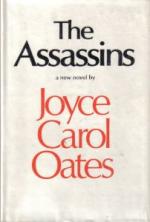|
This section contains 145 words (approx. 1 page at 300 words per page) |

|
The novel is realistic and naturalistic in the manner of Theodore Dreiser. The obsession with madness suggests Poe; the theme of murder and guilt invites comparison with Dostoyevsky's Crime and Punishment (1866). The opening sentence "I was born" recalls Dickens's David Copperfield (1849-1850); the focus on a dead man and his impact beyond the grave, both George Eliot's Middlemarch (1871-1872) and Trollope's Bare/tester Towers (1857). But the problem of unassigned guilt immediately recalls one of Oates's favorite works of literature, Franz Kafka's The Trial. Here the characters put themselves on trial, accuse themselves, and, in a sense, carry out their own executions. The fact of Andrew Petrie's death creates a literary context for the theme of personal responsibility, and conveys the haunting feeling that one can never really be cleansed of guilt, one can never really separate the evil from the good.
|
This section contains 145 words (approx. 1 page at 300 words per page) |

|




